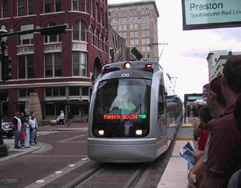Written by Mary Scott Nabers
President and CEO, Strategic Partnerships Inc.
 He may be the President-elect, but by trade, Donald Trump is a billionaire businessman and developer. Most believe it was his business acumen that resulted in his successful campaign for the presidency. And while some of his campaign promises were a little unconventional – a wall between the U.S. and Mexico strong enough to stop immigration – other promises were based on his belief that business and government can collaborate on projects to benefit both citizens and government.
He may be the President-elect, but by trade, Donald Trump is a billionaire businessman and developer. Most believe it was his business acumen that resulted in his successful campaign for the presidency. And while some of his campaign promises were a little unconventional – a wall between the U.S. and Mexico strong enough to stop immigration – other promises were based on his belief that business and government can collaborate on projects to benefit both citizens and government.
Never before in the history of the American presidency has a sitting president had the business development and financial expertise as well as the experience that Donald Trump brings to the White House. He regularly tells audiences that he will put his business know-how to good use and find ways to launch collaborative initiatives with private-sector partners.
From the outset of his campaign, Trump touted collaboration through public-private partnerships (P3s) to address essential transportation, water, energy, telecommunications and security issues. Since his election, he has made infrastructure investment one of his highest priorities. His “America’s Infrastructure First” plan is to use private capital, public assets and a public entity’s ability to leverage revenue from a P3 to spur infrastructure reform and create jobs.
He also made it clear that his infrastructure plan is not just for transportation projects, but for all types of infrastructure. During a speech in November, Trump said he plans to “rebuild our highways, bridges, tunnels, airports, schools, hospitals.”
Trump often refers to his own success in collaborating with government. His company was responsible for redevelopment of the historic Old Post Office building on Pennsylvania Avenue near the White House. The project was a public-private partnership, with Trump negotiating a long-term lease of the building from the General Services Administration (GSA). The partnership resulted in turning the federal building into a luxury hotel. Now the GSA receives payments of $250,000 per month for use of the building. Trump has said many times that this is an example of “what this country should be doing on a regular basis.”
A mix of public and private funding and assets in collaborative efforts is the foundation for the Trump administration’s economic thrust. Trump wants to infuse $1 trillion into the program. The P3 projects that emerge, however, will expand the concept of what most taxpayers think of as infrastructure-related projects. The administration indicated that infrastructure includes projects related to public safety facilities, energy assets, broadband coverage and possibly even cybersecurity.
Although the campaign rhetoric may have been a little stronger, Trump is still saying – passionately and often – how important public participation in government projects will be in in his administration. That’s good news for state and local governments. Thirty-five states have already passed some form of public-private partnership legislation to make it easier for government entities to access private capital for long-overdue projects.
Because transportation infrastructure repairs and replacement are essential to global leadership and job creation is what citizens want most, Trump’s $1 trillion infrastructure program will offer tax incentives for private companies that invest in infrastructure projects. Having a private partner to assume most of the risk while bringing leading-edge expertise to design, build, operate and maintain is attractive to every public official with critical needs. When a private-sector partner can also bring funding, it is even more appealing to government leaders.
Another area that could benefit from P3s is cybersecurity. Trump has vowed to put together a team that includes private-sector, military and civilian cybersecurity experts to review the country’s systems and technology. After the analysis, he says the focus will be on enhancing, modernizing and perhaps replacing technology to ensure that the nation’s systems are secure.
Public-private partnership engagements are already being used for more than 2,000 water projects in the U.S. and communities are benefitting from private-sector expertise and new technologies that are unique to the commercial sector. Watch for many more to be launched in the coming year.
Members of the U.S. Conference of Mayors recently made a pitch to Trump regarding their priorities. They advocated for significantly larger investments in water and wastewater infrastructure as well as increased funding for schools, roads, bridges and health care facilities. With some members of Congress already saying they are not ready to approve new spending, Trump’s program may possibly satisfy all stakeholders. Private investors stand ready to partner with public entities to launch critically needed infrastructure projects that would benefit communities exponentially.
 It would be wonderful – and significantly helpful – if taxpayers and public officials showed an outpouring of support for rebuilding the nation’s infrastructure. Congressional representatives need to know, without doubt, that there is home-town support for this. Without seeing support from constituents, it’s possible that the program could get delayed long enough to die a sad death. If that happens, the U.S. will remain vulnerable in the race for global leadership… and thousands of jobs that could have been created will be remembered only as “what might have been.”
It would be wonderful – and significantly helpful – if taxpayers and public officials showed an outpouring of support for rebuilding the nation’s infrastructure. Congressional representatives need to know, without doubt, that there is home-town support for this. Without seeing support from constituents, it’s possible that the program could get delayed long enough to die a sad death. If that happens, the U.S. will remain vulnerable in the race for global leadership… and thousands of jobs that could have been created will be remembered only as “what might have been.”
It is time for voters to reach out to Congress and show their support for infrastructure reform.
…
Mary Scott Nabers is president and CEO of Strategic Partnerships Inc., a business development company specializing in government contracting and procurement consulting throughout the U.S. Follow Mary on Twitter.
Tags: Donald Trump, Mary Scott Nabers, P3s, PPPs, President-Elect Trump, Public-Private Partnerships, Strategic Partnerships Inc., Trump






 RSS Feed
RSS Feed